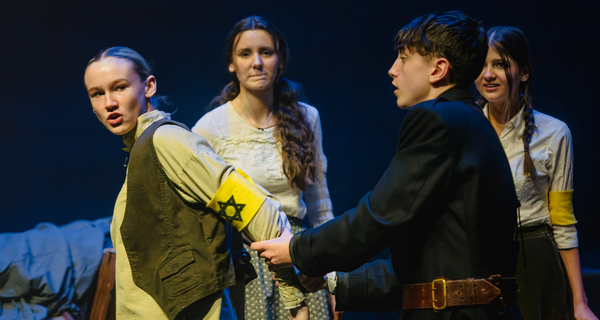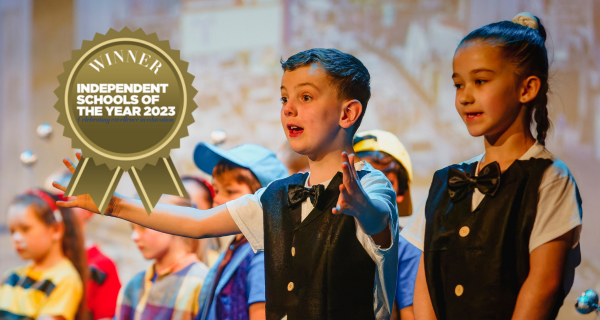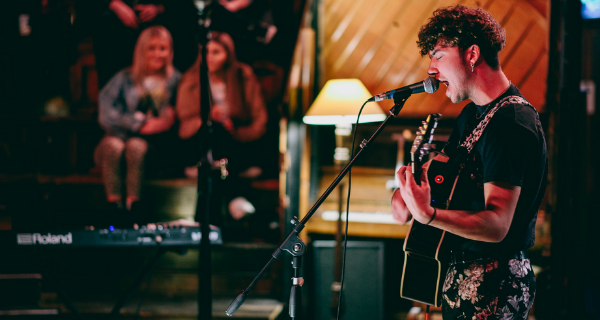This term our senior school students put on a compelling performance of ‘Dr Korczak’s Example’, a play written by former pupil and renowned playwright David Greig.
It tells the powerful and enduring true story of Dr Janusz Korczak, a Polish educator and children’s author who championed the rights of young people, believing every child has the right to freedom, respect and love.
ESMS School Captain, and one of the play’s Co-Directors, Zainab S, was lucky enough to have an audience with David. They sat down and explored everything from his inspiration for the play, to his fond memories of school…
What was your inspiration for Dr Korczak’s Example?
In the 1990s there was a director at the Tron Theatre, in Glasgow, called Irina Brown. She was a Russian woman who had come to Britain. She was working on a play called King Mat, which was a story by Korczak. She did this play at the Tron and told me about this man, Korczak, who I didn't know anything about. In the 1990s the Berlin Wall had only come down a few years previously, we were not intimately familiar with Eastern Europe, it wasn't really part of Europe in the way that it is now. We didn't know Polish stories in the way that we might now. Korczak had written all these amazing stories and was this extraordinary figure. I found it very interesting and inspiring, and in essence, that was the beginning of wanting to write about him. I wanted to explore the dilemma between Korczak, a great idealist, a pacifist, and the horror that they faced and the need to resist. The question of resistance and idealism is what the young characters are there to explore.
Out of the plays that you've written, which is your favourite?
Well, I have two answers to that question! The truthful answer is the one that has not yet been performed, and I mean that literally. I have a play called 'Bottom's Dream', which is about a man in his fifties, a retired builder who believes he's been made pregnant by the queen of the fairies, and his family have to deal with that. It's a comedy, I hasten to add, and slightly based on Midsummer Night's Dream.
I have a very soft spot for my play ‘Midsummer’ because it's a happy play, and it came to me with a lot of joy. It's a play with songs, it's set in Edinburgh, it's a romantic comedy, and I did it with my friend Gordon McIntyre, the singer songwriter from the band Ballboy. We had no money, but we set out to do a show just for joy. We had a rule, which is that we would only do things if we thought they were great, we weren't trying to impress anybody else, it was just for us. It turned out to be a very happy show that still gets performed around the world.
Do you enjoy watching performances of your plays, even if they are being directed very differently to how you had originally imagined?
I particularly enjoy them if they have been directed differently because I try not to imagine them on stage, I imagine them out in the world. When I'm writing, I'm not seeing a stage. For example, with Korczak, I'm writing, imagining a room in Warsaw. The first production is always stressful, but after that, if I travel somewhere in the world and they're doing one of my plays, I love seeing that.
Of all your plays directed differently, which did you find the most inspiring?
There was a play which wasn’t published very widely, it was published in an anthology by a company that I was in in the 1990s called ‘Suspect Culture’. We did a lot of shows together in the 1990s and early 2000s, and I wrote a play called ‘Mainstream’. It was a four-hander and we did it with four actors, four chairs, quite straightforward in a way. When I went to see the play in a production in Athens, they had filled the whole room with a ball pit, and all of the actors were up to their waists in the ball pit and they did the whole play like that. It was just absolutely beautiful and strange and sad, because it was sort of a metaphor for them slightly drowning in life.
How has the landscape for playwrights changed since you were at school?
Well, I didn't know I was going to be a playwright at school. I was very interested in theatre and took part in theatre and school plays but there weren’t so many new plays back then. Scotland was only just really emerging as a playwriting power, with playwrights like Liz Lochhead and John Byrne coming through. When I was in school you didn't really get to see much of Scotland in a play, apart from Macbeth, and you didn’t often get to see new plays, and that has really changed in my lifetime.
One bad thing is that the funding landscape for theatre has gotten much worse over the last 20 years, and it's much harder now to put plays on and they're all smaller. The Traverse used to perform seven plays a year and those plays would often be five, six or seven actors, and each of them was new, and that was just one company. Whereas now, we're down to two or three plays a year, and often with only two or three actors, so that's a bit of a disappointment.
What is your favourite play that you've seen?
That’s a tricky one. I think my favourite would be a play by Chekhov, called ‘Platonov’, but the version that I really, really like is adapted by an Australian playwright, and he called it ‘The Present’. It’s about a woman coming up to her 40th birthday and a man who she has been in love with who comes to the birthday party. Chekhov wrote it when he was quite young. I think he was only 19 or 20. It's the most beautiful play and it seems unbelievable to me that he could have written it so young, I just have no idea how he could have had that knowledge of human nature.
Going back to your school days, how did the school help you get to where you are today professionally?
Well, through theatre. I did plays at school and I enjoyed that very much. I also joined Edinburgh Youth Theatre, which was probably a big foundation for me too, and I joined because I enjoyed doing plays and drama at school. I had a great grounding from school. I had a teacher called Cameron Wyllie, who was a somewhat legendary English teacher, and another called Jock Richardson. Cameron was very interested in debating, he was very interested in theatre and cinema, and really enjoyed talking about ideas and literature. Jock was ex-Air Force, loved bullfighting and he loved Hemingway, and he loved to teach. They were two opposites of English teachers, but both of them completely inspired me and filled me with a joy for literature, reading, writing and poetry and how it could expand your mind. Jock was also part of the Hill Walking Club, and that's been the other great love of my life. Literature and walking, the two most important things that the school probably gave me.
What is your favourite memory from school?
Well, there’s an organ loft at SMC and you used to be able to sneak in there from the library, there used to be a secret door, and if Gilbert Parkhouse who ran the library didn’t catch you, you could sneak up there and be hidden away reading a book.
My friends were a big part of school. My friend Alan Wilkins also became a playwright and a drama teacher, and another friend Graham Stewart, now edits and a political magazine called The Critic Magazine. Another, Kamal, is a journalist, and Kevin is a dentist. But we weren’t that back then, we were just a gang of pals who loved books, rock music, and we would hang out after school, at the Gallery of Modern Art and be quite pretentious!
Do you have a personal motto?
Yes, I probably do; “nothing comes of nothing”. That's always been my guide. It came from my Dad, and I think it came from his father. It’s really a way of saying, if you do something, something might happen. Don’t get too hung up on things being perfect, just do it.
The other motto I have is never buy anything that is offered to you for sale in a station because it will always be a rip off!






